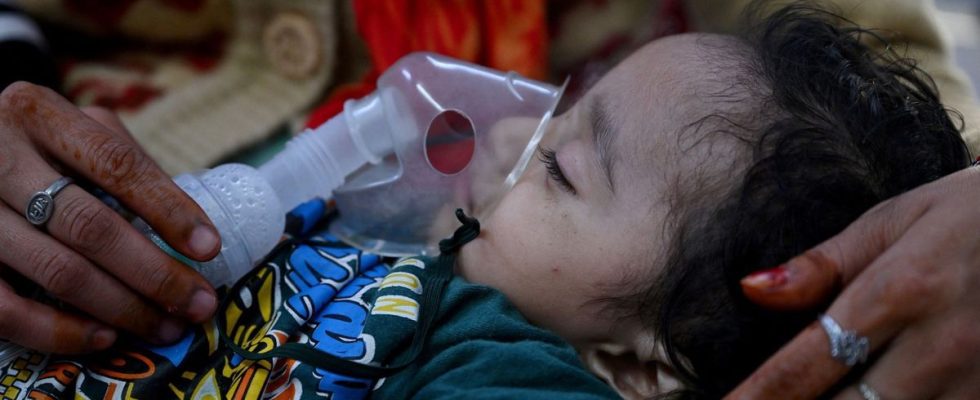Published on
Updated
Reading 3 min.
At only one month old, Ayansh Tiwari already wears a nebulizer mask on his little face, suffering from breathing difficulties that doctors attribute to inhaling the toxic air which, every winter, poisons the Indian capital.
The alarming condition of little Ayansh forced his parents to take him to the emergency room of the Chacha Nehru Bal Chikitsalaya government hospital.
Like him, all the children in this spartan emergency room are struggling to breathe. Many suffer from asthma and pneumonia. These conditions increase with peaks in air pollution fueled by agricultural burning, industrial emissions and road transport in the megacity of 30 million inhabitants.
“This poisonous fog is everywhere“, deplores Julie Tiwari, mother of Ayansh who coughs in her arms.
On Thursday, the level of PM 2.5, carcinogenic microparticles that penetrate the lungs and blood, rose to 390 micrograms per cubic meter of air, or 25 times the maximum daily level set by the World Health Organization ( WHO).
Respiratory diseases
“I try to keep doors and windows closed as much as possible. But we breathe poison all the time. I feel so helpless“, the 26-year-old young mother confided to AFP, on the verge of tears.
A study published in 2020 by The Lancet, a medical journal, attributed 1.67 million deaths a year earlier to air pollution in India, including nearly 17,500 in the capital.
“It’s a crazy crowd in our emergency rooms at this time.“, says Doctor Dhulika Dhingra, pediatric pulmonologist and director of the hospital.
Children are more vulnerable to air pollution because their brains and lungs, among other vital organs, are not fully developed, the doctor explains.
According to a study published in the journal Lung India in 2021, almost one in three schoolchildren in Delhi suffer from asthma and airway obstruction.
Additionally, children’s respiratory rates are higher than adults’, meaning they inhale more toxic air, Dr. Dhingra continues.
“They can’t stay still, they move and run and the respiratory rate increases at the same time. Which exposes them more to the effects of pollution“, she explains. “This season is very difficult for them, they can barely breathe“.
Mohammad Akhlad, an 11-month-old baby, has been suffering from pneumonia for eight days. “He was such a happy child. He’s been crying and coughing for the last few days“, worries his mother, Chandni Begum, the infant, listless and pale, on her knees.
“We can’t escape this poison in the air that makes us sick“, adds this housewife living in one of the city’s slums.
Like all the parents who crowd the corridors of the hospital, where treatments and medicines are provided free of charge, she cannot pay for treatment in a private clinic or afford a single air purifier.
According to Seema Kapoor, pediatrician and director of the hospital, the influx of patients has been constant since temperatures have dropped and pollutants are stagnating closer to the ground.
“Respiratory diseases represent 30 to 40% of total attendance“, she says.
Bad air and poverty
For Doctor Dhingra, the only advice to give to parents is to prevent their children from outdoor activities as much as possible.
“You realize: telling a parent not to let their child go out and play because of this toxic environment“.
The Delhi government announced the emergency closure of schools, halting construction sites and banning the movement of diesel vehicles.
But stubble burning in neighboring agricultural states, contributing significantly to Delhi’s pollution, continues unabated. The Supreme Court on Tuesday deplored “the real murder of our young people”.
But for distraught vegetable seller Imtiaz Qureshi in hospital, they are just words.
“We must live day by day in this air“, recalls this 40-year-old man, who spends his time in the streets. “If I go out the air will kill me, if I don’t the poverty will kill me“.
